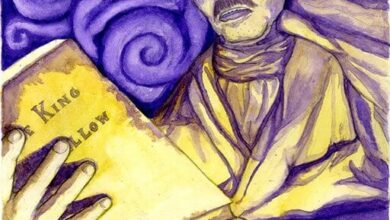
VII. At Fault
Four weeks went by so rapidly that every one refused to believe it when the major stated the fact at the breakfast-table, for all had enjoyed themselves so heartily that they had been unconscious of the lapse of time.
“You are not going away, uncle?” cried Amy, with a panic-stricken look.
“Next week, my dear; we must be off, for we’ve much to do yet, and I promised mamma to bring you back by the end of October.”
“Never mind Paris and the rest of it; this is pleasanter. I’d rather stay here–“
There Amy checked herself and tried to hide her face behind her coffee-cup, for Casimer looked up in a way that made her heart flutter and her cheeks burn.
“Sorry for it, Amy; but go we must, so enjoy your last week with all your might, and come again next year.”
“It will never be again what it is now,” sighed Amy; and Casimer echoed the words “next year,” as if sadly wondering if the present year would not be his last.
Helen rose silently and went into the garden, for of late she had fallen into the way of reading and working in the little pavilion which stood in an angle of the wall, overlooking lake and mountains.
A seat at the opposite end of the walk was Amy’s haunt, for she liked the sun, and within a week or two something like constraint had existed between the cousins. Each seemed happier apart, and each was intent on her own affairs. Helen watched over Amy’s health, but no longer offered advice or asked confidence. She often looked anxious, and once or twice urged the major to go, as if conscious of some danger.
But the worthy man seemed to have been bewitched as well as the young folks, and was quite happy sitting by the plump, placid widow, or leisurely walking with her to the chapel on the hillside.
All seemed waiting for something to break up the party, and no one had the courage to do it. The major’s decision took every one by surprise, and Amy and Casimer looked as if they had fallen from the clouds.
The persistency with which the English lessons had gone on was amazing, for Amy usually tired of everything in a day or two. Now, however, she was a devoted teacher, and her pupil did her great credit by the rapidity with which he caught the language. It looked like pleasant play, sitting among the roses day after day, Amy affecting to embroider while she taught, Casimer marching to and fro on the wide, low wall, below which lay the lake, while he learned his lesson; then standing before her to recite, or lounging on the turf in frequent fits of idleness, both talking and laughing a great deal, and generally forgetting everything but the pleasure of being together. They wrote little notes as exercises–Amy in French, Casimer in English, and each corrected the other’s.
All very well for a time; but as the notes increased the corrections decreased, and at last nothing was said of ungrammatical French or comical English and the little notes were exchanged in silence.
As Amy took her place that day she looked forlorn, and when her pupil came her only welcome was a reproachful–
“You are very late, sir.”
“It is fifteen of minutes yet to ten clocks,” was Casimer’s reply, in his best English.
“Ten o’clock, and leave out ‘of’ before minutes. How many times must I tell you that?” said Amy, severely, to cover her first mistake.
“Ah, not many times; soon all goes to finish, and I have none person to make this charming English go in my so stupide head.”
“What will you do then?”
“I jeter myself into the lake.”
“Don’t be foolish; I’m dull to-day, and want to be cheered up; suicide isn’t a pleasant subject.”
“Good! See here, then–a little plaisanterie–what you call joke. Can you will to see it?” and he laid a little pink cocked-hat note on her lap, looking like a mischievous boy as he did so.
“‘Mon Casimer Teblinski;’ I see no joke;” and Amy was about to tear it up, when he caught it from destruction, and holding it out of reach, said, laughing wickedly,–
“The ‘mon’ is one abbreviation of ‘monsieur,’ but you put no little–how do you say?–period at the end of him; it goes now in English–My Casimer Teblinski,’ and that is of the most charming address.”
Amy colored, but had her return shot ready.
“Don’t exult; that was only an oversight, not a deliberate deception like that you put upon me. It was very wrong and rude, and I shall not forgive it.”
“Mon Dieu! where have I gone in sinning! I am a polisson, as I say each day, but not a villain, I swear to you. Say to me that which I have made of wrong, and I will do penance.”
“You told me ‘Ma drogha‘ was the Polish for ‘My pupil,’ and let me call you so a long time; I am wiser now,” replied Amy, with great dignity.
“Who has said stupidities to you, that you doubt me?” and Casimer assumed an injured look, though his eyes danced with merriment.
“I heard Hoffman singing a Polish song to little Roserl, the burden of which was, ‘Ma drogha, Ma drogha,’ and when I asked him to translate it, those two words meant, ‘My darling.’ How dare you, ungrateful creature that you are!”
As Amy spoke, half-confusedly, half-angrily, Casimer went down upon his knees, with folded hands and penitent face, exclaiming, in good English,–
“Be merciful to me a sinner. I was tempted, and I could not resist.”
“Get up this instant, and stop laughing. Say your lesson, for this will be your last,” was the stern reply, though Amy’s face dimpled all over with suppressed merriment.
He rose meekly, but made such sad work with the verb “To love,” that his teacher was glad to put an end to it, by proposing to read her French to him. It was “Thaddeus of Warsaw,” a musty little translation which she had found in the house, and begun for her own amusement. Casimer read a little, seemed interested, and suggested that they read it together, so that he might correct her accent. Amy agreed, and they were in the heart of the sentimental romance, finding it more interesting than most modern readers, for the girl had an improved Thaddeus before her, and the Pole a fairer, kinder Mary Beaufort.
Dangerous times for both, but therein lay the charm; for, though Amy said to herself each night, “Sick, Catholic, and a foreigner,–it can never be,” yet each morning she felt, with increasing force, how blank her day would be without him. And Casimer, honorably restraining every word of love, yet looked volumes, and in spite of the glasses, the girl felt the eloquence of the fine eyes they could not entirely conceal.
To-day, as she read, he listened with his head leaning on his hand, and though she never had read worse, he made no correction, but sat so motionless, she fancied at last that he had actually fallen asleep. Thinking to rouse him, she said, in French,–
“Poor Thaddeus! don’t you pity him?–alone, poor, sick, and afraid to own his love.”
“No, I hate him, the absurd imbecile, with his fine boots and plumes, and tragedy airs. He was not to be pitied, for he recovered health, he found a fortune, he won his Marie. His sufferings were nothing; there was no fatal blight on him, and he had time and power to conquer his misfortunes, while I–“
Casimer spoke with sudden passion, and pausing abruptly, turned his face away, as if to hide some emotion he was too proud to show.
Amy’s heart ached, and her eyes filled, but her voice was sweet and steady, as she said, putting by the book, like one weary of it,–
“Are you suffering to-day? Can we do anything for you? Please let us, if we may.”
“You give me all I can receive; no one can help my pain yet; but a time will come when something may be done for me; then I will speak.” And, to her great surprise, he rose and left her, without another word.
She saw him no more till evening; then he looked excited, played stormily, and would sing in defiance of danger. The trouble in Amy’s face seemed reflected in Helen’s, though not a word had passed between them. She kept her eye on Casimer, with an intentness that worried Amy, and even when he was at the instrument Helen stood near him, as if fascinated, watching the slender hands chase one another up and down the keys with untiring strength and skill.
Suddenly she left the room and did not return. Amy was so nervous by that time, she could restrain herself no longer, and slipping out, found her cousin in their chamber, poring over a glove.
“Oh, Nell, what is it? You are so odd to-night I can’t understand you. The music excites me, and I’m miserable, and I want to know what has happened,” she said, tearfully.
“I’ve found him!” whispered Helen, eagerly, holding up the glove with a gesture of triumph.
“Who?” asked Amy, blinded by her tears.
“The baron.”
“Where?–when?” cried the girl, amazed.
“Here, and now.”
“Don’t take my breath away; tell me quick, or I shall get hysterical.”
“Casimer is Sigismund Palsdorf, and no more a Pole than I am,” was Helen’s answer.
Amy dropped in a heap on the floor, not fainting, but so amazed she had neither strength nor breath left. Sitting by her, Helen rapidly went on,–
“I had a feeling as if something was wrong, and began to watch. The feeling grew, but I discovered nothing till to-day. It will make you laugh, it was so unromantic. As I looked over uncle’s things when the laundress brought them this afternoon, I found a collar that was not his. It was marked ‘S.P.,’ and I at once felt a great desire to know who owned it. The woman was waiting for her money, and I asked her. ‘Monsieur Pologne,’ she said, for his name is too much for her. She took it into his room, and that was the end of it.”
“But it may be another name; the initials only a coincidence,” faltered Amy, looking frightened.
“No, dear, it isn’t; there is more to come. Little Roserl came crying through the hall an hour ago, and I asked what the trouble was. She showed me a prettily-bound prayer-book which she had taken from the Pole’s room to play with, and had been ordered by her mother to carry back. I looked into it; no name, but the same coat-of-arms as the glove and the handkerchief. To-night as he played I examined his hands; they are peculiar, and some of the peculiarities have left traces on the glove. I am sure it is he, for on looking back many things confirm the idea. He says he is a polisson, a rogue, fond of jokes, and clever at playing them. The Germans are famous for masquerading and practical jokes; this is one, I am sure, and uncle will be terribly angry if he discovers it.”
“But why all this concealment?” cried Amy. “Why play jokes on us? You look so worried I know you have not told me all you know or fear.”
“I confess I do fear that these men are political plotters as well as exiles. There are many such, and they make tools of rich and ignorant foreigners to further their ends. Uncle is rich, generous, and unsuspicious; and I fear that while apparently serving and enjoying us they are using him.”
“Heavens, it may be! and that would account for the change we see in him. I thought he was in love with the widow, but that may be only a cloak to hide darker designs. Karl brought us here, and I dare say it is a den of conspirators!” cried Amy, feeling as if she were getting more of an adventure than she had bargained for.
“Don’t be alarmed! I am on the watch, and mean to demand an explanation from uncle, or take you away on my own responsibility, if I can.”
Here a maid tapped to say that tea was served.
“We must go down, or some one will suspect trouble. Plead headache to excuse your paleness, and I’ll keep people away. We will manage the affair and be off as soon as possible,” said Helen, as Amy followed her, too bewildered to answer.
Casimer was not in the room, the major and Mrs. Cumberland were sipping tea side by side, and the professors roaming vaguely about. To leave Amy in peace, Helen engaged them both in a lively chat, and her cousin sat by the window trying to collect her thoughts. Some one was pacing up and down the garden, hatless, in the dew.
Amy forgot everything but the danger of such exposure to her reckless friend. His cloak and hat lay on a chair; she caught them up and glided unperceived from the long window.
“You are so imprudent I fear for you, and bring your things,” said a timid voice, as the little white figure approached the tall black one, striding down the path tempestuously.
“You to think of me, forgetful of yourself! Little angel of kindness, why do you take such care of me?” cried Casimer, eagerly taking not only the cloak, but the hands that held it.
“I pitied you because you were ill and lonely. You do not deserve my pity, but I forgive that, and would not see you suffer,” was the reproachful answer, as Amy turned away.
But he held her fast, saying earnestly,–
“What have I done? You are angry. Tell me my fault and I will amend.”
“You have deceived me.”
“How?”
“Will you own the truth?” and in her eagerness to set her fears at rest, Amy forgot Helen.
“I will.”
She could not see his face, but his voice was steady and his manner earnest.
“Tell me, then, is not your true name Sigismund Palsdorf?”
He started, but answered instantly,–
“It is not.”
“You are not the baron?” cried Amy.
“No; I will swear it if you wish.”
“Who, then, are you?”
“Shall I confess?”
“Yes, I entreat you.”
“Remember, you command me to speak.”
“I do. Who are you?”
“Your lover.”
The words were breathed into her ear as softly as ardently, but they startled her so much she could find no reply, and, throwing himself down before her, Casimer poured out his passion with an impetuosity that held her breathless.
“Yes, I love you, and I tell it, vain and dishonorable as it is in one like me. I try to hide it. I say ‘it cannot be.’ I plan to go away. But you keep me; you are angel-good to me; you take my heart, you care for me, teach me, pity me, and I can only love and die. I know it is folly; I ask nothing; I pray to God to bless you always, and I say, Go, go, before it is too late for you, as now for me!”
“Yes, I must go–it is all wrong. Forgive me. I have been very selfish. Oh, forget me and be happy,” faltered Amy, feeling that her only safety was in flight.
“Go! go!” he cried, in a heart-broken tone, yet still kissed and clung to her hands till she tore them away and fled into the house.
Helen missed her soon after she went, but could not follow for several minutes; then went to their chamber and there found Amy drowned in tears, and terribly agitated.
Soon the story was told with sobs and moans, and despairing lamentations fit to touch a heart of stone.
“I do love him–oh, I do; but I didn’t know it till he was so unhappy, and now I’ve done this dreadful harm. He’ll die, and I can’t help him, see him, or be anything to him. Oh, I’ve been a wicked, wicked girl, and never can be happy any more.”
Angry, perplexed, and conscience-stricken, for what now seemed blind and unwise submission to the major, Helen devoted herself to calming Amy, and when at last the poor, broken-hearted little soul fell asleep in her arms, she pondered half the night upon the still unsolved enigma of the Baron Sigismund.
VIII. More Mystery
“Uncle, can I speak to you a moment?” said Helen, very gravely, as they left the breakfast-room next morning.
“Not now, my dear, I’m busy,” was the hasty reply, as the major shawled Mrs. Cumberland for an early promenade.
Helen knit her brows irefully, for this answer had been given her half a dozen times lately when she asked for an interview. It was evident he wished to avoid all lectures, remonstrances, and explanations; and it was also evident that he was in love with the widow.
“Lovers are worse than lunatics to manage, so it is vain to try to get any help from him,” sighed Helen, adding, as her uncle was gallantly leading his stout divinity away into the garden: “Amy has a bad headache, and I shall stay to take care of her, so we can’t join your party to Chillon, sir. We have been there once, so you needn’t postpone it for us.”
“Very well, my dear,” and the major walked away, looking much relieved.
As Helen was about to leave the salon Casimer appeared. A single glance at her face assured him that she knew all, and instantly assuming a confiding, persuasive air that was irresistible, he said, meekly,–
“Mademoiselle, I do not deserve a word from you, but it desolates me to know that I have grieved the little angel who is too dear to me. For her sake, pardon that I spoke my heart in spite of prudence, and permit me to send her this.”
Helen glanced from the flowers he held to his beseeching face, and her own softened. He looked so penitent and anxious, she had not the heart to reproach him.
“I will forgive you and carry your gift to Amy on one condition,” she said, gravely.
“Ah, you are kind! Name, then, the condition. I implore you, and I will agree.”
“Tell me, then, on your honor as a gentleman, are you not Baron Palsdorf?”
“On my honor as a gentleman, I swear to you I am not.”
“Are you, in truth, what you profess to be?”
“I am, in truth, Amy’s lover, your devoted servant, and a most unhappy man, with but a little while to live. Believe this and pity me, dearest Mademoiselle Helene.”
She did pity him, her eyes betrayed that, and her voice was very kind, as she said,–
“Pardon my doubts. I trust you now, and wish with all my heart that it was possible to make you happy. You know it is not, therefore I am sure you will be wise and generous, and spare Amy further grief by avoiding her for the little time we stay. Promise me this, Casimer.”
“I may see her if I am dumb? Do not deny me this. I will not speak, but I must look at my little and dear angel when she is near.”
He pleaded so ardently with lips and hands, and eager eyes, that Helen could not deny him, and when he had poured out his thanks she left him, feeling very tender toward the unhappy young lover, whose passion was so hopeless, yet so warm.
Amy was at breakfast in her room, sobbing and sipping, moaning and munching, for, though her grief was great, her appetite was good, and she was in no mood to see anything comical in cracking eggshells while she bewailed her broken heart, or in eating honey in the act of lamenting the bitterness of her fate.
Casimer would have become desperate had he seen her in the little blue wrapper, with her bright hair loose on her shoulders, and her pretty face wet with tears, as she dropped her spoon to seize his flowers,–three dewy roses, one a bud, one half and the other fully blown, making a fragrant record and avowal of the love which she must renounce.
“Oh, my dear boy! how can I give him up, when he is so fond, and I am all he has? Helen, uncle must let me write or go to mamma. She shall decide; I can’t; and no one else has a right to part us,” sobbed Amy, over her roses.
“Casimer will not marry, dear; he is too generous to ask such a sacrifice,” began Helen, but Amy cried indignantly,–
“It is no sacrifice; I’m rich. What do I care for his poverty?”
“His religion!” hinted Helen, anxiously.
“It need not part us; we can believe what we will. He is good; why mind whether he is Catholic or Protestant?”
“But a Pole, Amy, so different in tastes, habits, character, and beliefs. It is a great risk to marry a foreigner; races are so unlike.”
“I don’t care if he is a Tartar, a Calmuck, or any of the other wild tribes; I love him, he loves me, and no one need object if I don’t.”
“But, dear, the great and sad objection still remains–his health. He just said he had but a little while to live.”
Amy’s angry eyes grew dim, but she answered, with soft earnestness,–
“So much the more need of me to make that little while happy. Think how much he has suffered and done for others; surely I may do something for him. Oh, Nell, can I let him die alone and in exile, when I have both heart and home to give him?”
Helen could say no more; she kissed and comforted the faithful little soul, feeling all the while such sympathy and tenderness that she wondered at herself, for with this interest in the love of another came a sad sense of loneliness, as if she was denied the sweet experience that every woman longs to know.
Amy never could remain long under a cloud, and seeing Helen’s tears, began to cheer both her cousin and herself.
“Hoffman said he might live with care, don’t you remember? and Hoffman knows the case better than we. Let us ask him if Casimer is worse. You do it; I can’t without betraying myself.”
“I will,” and Helen felt grateful for any pretext to address a friendly word to Karl, who had looked sad of late, and had been less with them since the major became absorbed in Mrs. Cumberland.
Leaving Amy to compose herself, Helen went away to find Hoffman. It was never difficult, for he seemed to divine her wishes and appear uncalled the moment he was wanted. Hardly had she reached her favorite nook in the garden when he approached with letters, and asked with respectful anxiety, as she glanced at and threw them by with an impatient sigh,–
“Has mademoiselle any orders? Will the ladies drive, sail, or make a little expedition? It is fine, and mademoiselle looks as if the air would refresh her. Pardon that I make the suggestion.”
“No, Hoffman, I don’t like the air of this place, and intend to leave as soon as possible.” And Helen knit her delicate dark brows with an expression of great determination. “Switzerland is the refuge of political exiles, and I hate plots and disguises; I feel oppressed by some mystery, and mean to solve or break away from it at once.”
She stopped abruptly, longing to ask his help, yet withheld by a sudden sense of shyness in approaching the subject, though she had decided to speak to Karl of the Pole.
“Can I serve you, mademoiselle? If so, pray command me,” he said, eagerly, coming a step nearer.
“You can, and I intend to ask your advice, for there can be nothing amiss in doing so, since you are a friend of Casimer’s.”
“I am both friend and confidant, mademoiselle,” he answered, as if anxious to let her understand that he knew all, without the embarrassment of words. She looked up quickly, relieved, yet troubled.
“He has told you, then?”
“Everything, mademoiselle. Pardon me if this afflicts you; I am his only friend here, and the poor lad sorely needed comfort.”
“He did. I am not annoyed; I am glad, for I know you will sustain him. Now I may speak freely, and be equally frank. Please tell me if he is indeed fatally ill?”
“It was thought so some months ago; now I hope. Happiness cures many ills, and since he has loved, he has improved. I always thought care would save him; he is worth it.”
Hoffman paused, as if fearful of venturing too far; but Helen seemed to confide freely in him, and said, softly,–
“Ah, if it were only wise to let him be happy. It is so bitter to deny love.”
“God knows it is!”
The exclamation broke from Hoffman as if an irrepressible impulse wrung it from him.
Helen started, and for a moment neither spoke. She collected herself soonest, and without turning, said, quietly,–
“I have been troubled by a strong impression that Casimer is not what he seems. Till he denied it on his honor I believed him to be Baron Palsdorf. Did he speak the truth when he said he was not?”
“Yes, mademoiselle.”
“Then, Casimer Teblinski is his real name?”
No answer.
She turned sharply, and added,–
“For my cousin’s sake, I must know the truth. Several curious coincidences make me strongly suspect that he is passing under an assumed name.”
Not a word said Hoffman, but looked on the ground, as motionless and expressionless as a statue.
Helen lost patience, and in order to show how much she had discovered, rapidly told the story of the gloves, ring, handkerchief, prayer-book and collar, omitting all hint of the girlish romance they had woven about these things.
As she ended, Hoffman looked up with a curious expression, in which confusion, amusement, admiration and annoyance seemed to contend.
“Mademoiselle,” he said, gravely, “I am about to prove to you that I feel honored by the confidence you place in me. I cannot break my word, but I will confess to you that Casimer does not bear his own name.”
“I knew it!” said Helen, with a flash of triumph in her eyes. “He is the baron, and no Pole. You Germans love masquerades and jokes. This is one, but I must spoil it before it is played out.”
“Pardon; mademoiselle is keen, but in this she is mistaken. Casimer is not the baron; he did fight for Poland, and his name is known and honored there. Of this I solemnly assure you.”
She stood up and looked him straight in the face. He met her eye to eye, and never wavered till her own fell.
She mused a few minutes, entirely forgetful of herself in her eagerness to solve the mystery.
Hoffman stood so near that her dress touched him, and the wind blew her scarf against his hand; and as she thought he watched her while his eyes kindled, his color rose, and once he opened his lips to speak, but she moved at the instant, and exclaimed,–
“I have it!”
“Now for it,” he muttered, as if preparing for some new surprise or attack.
“When uncle used to talk about the Polish revolution, there was, I remember a gallant young Pole who did something brave. The name just flashed on me, and it clears up my doubts. Stanislas Prakora–‘S.P.’–and Casimer is the man.”
Helen spoke with an eager, bright face, as if sure of the truth now; but, to her surprise, Hoffman laughed, a short, irrepressible laugh, full of hearty but brief merriment. He sobered in a breath, and with an entire change of countenance said, in an embarrassed tone,–
“Pardon my rudeness; mademoiselle’s acuteness threw me off my guard. I can say nothing till released from my promise; but mademoiselle may rest assured that Casimer Teblinski is as good and brave a man as Stanislas Prakora.”
Helen’s eyes sparkled, for in this reluctant reply she read confirmation of her suspicion, and thought that Amy would rejoice to learn that her lover was a hero.
“You are exiles, but still hope and plot, and never relinquish your hearts’ desire?”
“Never, mademoiselle!”
“You are in danger?”
“In daily peril of losing all we most love and long for,” answered Karl, with such passion that Helen found patriotism a lovely and inspiring thing.
“You have enemies?” she asked, unable to control her interest, and feeling the charm of these confidences.
“Alas! yes,” was the mournful reply, as Karl dropped his eyes to hide the curious expression of mirth which he could not banish from them.
“Can you not conquer them, or escape the danger they place you in?”
“We hope to conquer, we cannot escape.”
“This accounts for your disguise and Casimer’s false name?”
“Yes. We beg that mademoiselle will pardon us the anxiety and perplexity we have caused her, and hope that a time will soon arrive when we may be ourselves. I fear the romantic interest with which the ladies have honored us will be much lessened, but we shall still remain their most humble and devoted servants.”
Something in his tone nettled Helen, and she said sharply,–
“All this may be amusing to you, but it spoils my confidence in others to know they wear masks. Is your name also false?”
“I am Karl Hoffman, as surely as the sun shines, mademoiselle. Do not wound me by a doubt,” he said, eagerly.
“And nothing more?”
She smiled as she spoke, and glanced at his darkened skin with a shake of the head.
“I dare not answer that.”
“No matter; I hate titles, and value people for their own worth, not for their rank.”
Helen spoke impulsively, and, as if carried away by her words and manner, Hoffman caught her hand and pressed his lips to it ardently, dropped it, and was gone, as if fearing to trust himself a moment longer.
Helen stood where he left her, thinking, with a shy glance from her hand to the spot where he had stood,–
“It is pleasant to have one’s hand kissed, as Amy said. Poor Karl, his fate is almost as hard as Casimer’s.”
Some subtile power seemed to make the four young people shun one another carefully, though all longed to be together. The major appeared to share the secret disquiet that made the rest roam listlessly about, till little Roserl came to invite them to a fete in honor of the vintage. All were glad to go, hoping in the novelty and excitement to recover their composure.
The vineyard sloped up from the chateau, and on the hillside was a small plateau of level sward, shadowed by a venerable oak now hung with garlands, while underneath danced the chateau servants with their families, to the music of a pipe played by little Friedel. As the gentlefolk approached, the revel stopped, but the major, who was in an antic mood and disposed to be gracious, bade Friedel play on, and as Mrs. Cumberland refused his hand with a glance at her weeds, the major turned to the Count’s buxom housekeeper, and besought her to waltz with him. She assented, and away they went as nimbly as the best. Amy laughed, but stopped to blush, as Casimer came up with an imploring glance, and whispered,–
“Is it possible that I may enjoy one divine waltz with you before I go?”
Amy gave him her hand with a glad assent, and Helen was left alone. Every one was dancing but herself and Hoffman, who stood near by, apparently unconscious of the fact. He glanced covertly at her, and saw that she was beating time with foot and hand, that her eyes shone, her lips smiled. He seemed to take courage at this, for, walking straight up to her, he said, as coolly as if a crown-prince,–
“Mademoiselle, may I have the honor?”
A flash of surprise passed over her face, but there was no anger, pride, or hesitation in her manner, as she leaned toward him with a quiet “Thanks, monsieur.”
A look of triumph was in his eyes as he swept her away to dance, as she had never danced before, for a German waltz is full of life and spirit, wonderfully captivating to English girls, and German gentlemen make it a memorable experience when they please. As they circled round the rustic ball-room, Hoffman never took his eyes off Helen’s, and, as if fascinated, she looked up at him, half conscious that he was reading her heart as she read his. He said not a word, but his face grew very tender, very beautiful in her sight, as she forgot everything except that he had saved her life and she loved him. When they paused, she was breathless and pale; he also; and seating her he went away to bring her a glass of wine. As her dizzy eyes grew clear, she saw a little case at her feet, and taking it up, opened it. A worn paper, containing some faded forget-me-nots and these words, fell out,–
“Gathered where Helen sat on the night of August 10th.”
There was just time to restore its contents to the case, when Hoffman returned, saw it, and looked intensely annoyed as he asked, quickly,–
“Did you read the name on it?”
“I saw only the flowers;” and Helen colored beautifully as she spoke.
“And read them?” he asked, with a look she could not meet.
She was spared an answer, for just then a lad came up, saying, as he offered a note,–
“Monsieur Hoffman, madame, at the hotel, sends you this, and begs you to come at once.”
As he impatiently opened it, the wind blew the paper into Helen’s lap. She restored it, and in the act, her quick eye caught the signature, “Thine ever, Ludmilla.”
A slight shadow passed over her face, leaving it very cold and quiet. Hoffman saw the change, and smiled, as if well pleased, but assuming suddenly his usual manner, said deferentially,–
“Will mademoiselle permit me to visit my friend for an hour?–she is expecting me.”
“Go, then, we do not need you,” was the brief reply, in a careless tone, as if his absence was a thing of no interest to any one.
“Thanks; I shall not be long away;” and giving her a glance that made her turn scarlet with anger at its undisguised admiration, he walked away, humming gayly to himself Goethe’s lines,–
“Maiden’s heart and city’s wall Were made to yield, were made to fall; When we’ve held them each their day, Soldier-like we march away.”




